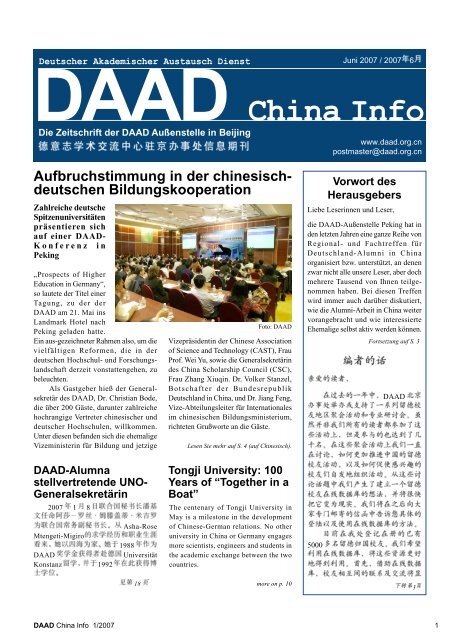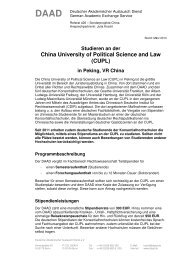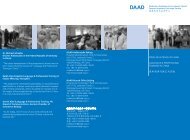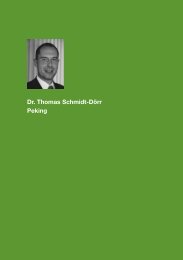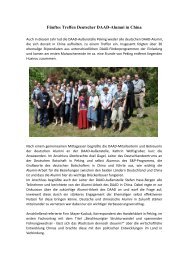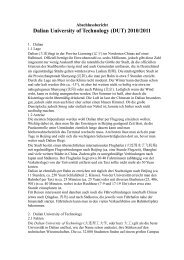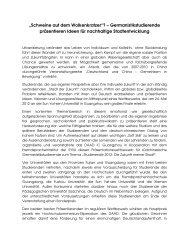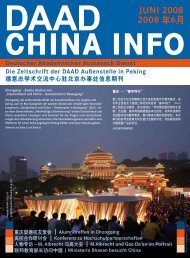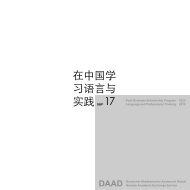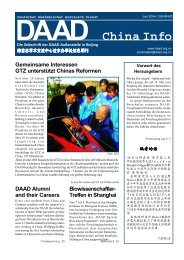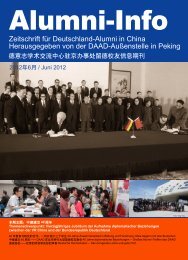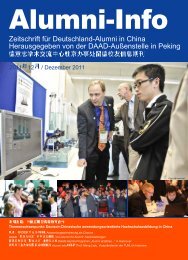China Info
China Info
China Info
You also want an ePaper? Increase the reach of your titles
YUMPU automatically turns print PDFs into web optimized ePapers that Google loves.
Deutscher Akademischer Austausch Dienst Juni 2007 / 2007 6<br />
DAAD <strong>China</strong> <strong>Info</strong><br />
Die Zeitschrift der DAAD Außenstelle in Beijing<br />
www.daad.org.cn<br />
postmaster@daad.org.cn<br />
Aufbruchstimmung in der chinesischdeutschen<br />
Bildungskooperation<br />
Zahlreiche deutsche<br />
Spitzenuniversitäten<br />
präsentieren sich<br />
auf einer DAAD-<br />
Konferenz in<br />
Peking<br />
„Prospects of Higher<br />
Education in Germany“,<br />
so lautete der Titel einer<br />
Tagung, zu der der<br />
DAAD am 21. Mai ins<br />
Landmark Hotel nach<br />
Peking geladen hatte.<br />
Ein aus-gezeichneter Rahmen also, um die<br />
vielfältigen Reformen, die in der<br />
deutschen Hochschul- und Forschungslandschaft<br />
derzeit vonstattengehen, zu<br />
beleuchten.<br />
Als Gastgeber hieß der Generalsekretär<br />
des DAAD, Dr. Christian Bode,<br />
die über 200 Gäste, darunter zahlreiche<br />
hochrangige Vertreter chinesischer und<br />
deutscher Hochschulen, willkommen.<br />
Unter diesen befanden sich die ehemalige<br />
Vizeministerin für Bildung und jetzige<br />
DAAD-Alumna<br />
stellvertretende UNO-<br />
Generalsekretärin<br />
2007 1 8<br />
Asha-Rose<br />
Mtengeti-Migiro<br />
1988<br />
DAAD Universität<br />
Konstanz 1992<br />
DAAD <strong>China</strong> <strong>Info</strong> 1/2007<br />
18<br />
Foto: DAAD<br />
Vizepräsidentin der Chinese Association<br />
of Science and Technology (CAST), Frau<br />
Prof. Wei Yu, sowie die Generalsekretärin<br />
des <strong>China</strong> Scholarship Council (CSC),<br />
Frau Zhang Xiuqin. Dr. Volker Stanzel,<br />
Botschafter der Bundesrepublik<br />
Deutschland in <strong>China</strong>, und Dr. Jiang Feng,<br />
Vize-Abteilungsleiter für Internationales<br />
im chinesischen Bildungsministerium,<br />
richteten Grußworte an die Gäste.<br />
Lesen Sie mehr auf S. 4 (auf Chinesisch).<br />
Tongji University: 100<br />
Years of “Together in a<br />
Boat”<br />
The centenary of Tongji University in<br />
May is a milestone in the development<br />
of Chinese-German relations. No other<br />
university in <strong>China</strong> or Germany engages<br />
more scientists, engineers and students in<br />
the academic exchange between the two<br />
countries.<br />
more on p. 10<br />
Vorwort des<br />
Herausgebers<br />
Liebe Leserinnen und Leser,<br />
die DAAD-Außenstelle Peking hat in<br />
den letzten Jahren eine ganze Reihe von<br />
Regional- und Fachtreffen für<br />
Deutschland-Alumni in <strong>China</strong><br />
organisiert bzw. unterstützt, an denen<br />
zwar nicht alle unsere Leser, aber doch<br />
mehrere Tausend von Ihnen teilgenommen<br />
haben. Bei diesen Treffen<br />
wird immer auch darüber diskutiert,<br />
wie die Alumni-Arbeit in <strong>China</strong> weiter<br />
vorangebracht und wie interessierte<br />
Ehemalige selbst aktiv werden können.<br />
5000<br />
Fortsetzung auf S. 3<br />
DAAD<br />
3<br />
1
DAAD <strong>China</strong> <strong>Info</strong> 1/2007
Aus diesen Diskussionen wurde die Idee<br />
einer Online-Datenbank für<br />
Deutschland-Alumni in <strong>China</strong><br />
entwickelt, die in Kürze freigeschaltet<br />
wird. Wir werden Sie mit separater Post<br />
über Ihre Zugangs- und Nutzungsmöglichkeiten<br />
unterrichten. Mit der<br />
Online-Alumnidatenbank verbinden wir<br />
die Hoffnung, dass das riesige Potential,<br />
das die mittlerweile an die 5.000<br />
registrierten Deutschland-Alumni<br />
darstellen, besser nutzbar gemacht<br />
werden kann. Vor allem die aktive<br />
gegenseitige Kontaktaufnahme und das<br />
individuelle Networking werden durch<br />
die Online-Datenbank deutlich<br />
vereinfacht werden.<br />
Auch für die zahlreichen aus<br />
Deutschland zurückkehrenden<br />
Chinesinnen und Chinesen dürfte die<br />
neue Online-Datenbank von hohem Interesse<br />
sein. Sie erhalten die<br />
Möglichkeit, sich mit anderen Deutschland-Alumni<br />
am selben Ort oder<br />
ähnlicher Fachgebiete in Verbindung zu<br />
DAAD <strong>China</strong> <strong>Info</strong> wird als kostenlose<br />
Mitteilungsbroschüre von der DAAD-<br />
Außenstelle Peking herausgegeben.<br />
DAAD <strong>China</strong> <strong>Info</strong><br />
Impressum<br />
Herausgeber<br />
DAAD-Außenstelle Peking<br />
Dr. Thomas Schmidt-Dörr<br />
Redaktion<br />
Deutsch/Englisch: Maja Linnemann (ml),<br />
Mirjam Tröster (mt), Dr. Stefanie Eschenlohr<br />
(ste)<br />
Englisch: Stan Dyer<br />
Chinesisch: Huang Guanfu (hgf), Zheng Yi<br />
(zy)<br />
Gestaltung<br />
Natasa Vizin<br />
Layout<br />
Zhao Pengpeng<br />
DAAD-Außenstelle Peking<br />
Unit 1718, Landmark Tower 2<br />
8, North Dongsanhuan Rd.<br />
Chaoyang District<br />
100004 Beijing<br />
100004<br />
8<br />
2 1718<br />
Tel./ : 0086 10 65906656/76<br />
Fax/ : 0086 10 65906393<br />
Internet: www.daad.org.cn<br />
E-Mail: postmaster@daad.org.cn<br />
DAAD <strong>China</strong> <strong>Info</strong> 1/2007<br />
setzen, was den beruflichen Neu- oder<br />
Wiedereinstieg in <strong>China</strong> erheblich<br />
erleichtert. Wir hoffen auf rege Nutzung!<br />
Zum Schluss noch eine persönliche<br />
Mitteilung: Dies ist mein letztes DAAD<br />
<strong>China</strong> <strong>Info</strong>. Nach fast sechseinhalb Jahren<br />
gebe ich die Leitung der DAAD-<br />
Außenstelle Peking zum 1. Juli 2007 ab.<br />
Den deutsch-chinesischen Hochschulbeziehungen<br />
bleibe ich auch in Zukunft<br />
erhalten. Ich werde für die Freie<br />
Universität Berlin ein Projektbüro an der<br />
DAAD-Außenstelle aufbauen. Mehr zu<br />
diesem und anderen Hochschulbüros an<br />
der DAAD-Außenstelle finden Sie auf S. 6.<br />
Mein Nachfolger als Leiter der<br />
DAAD-Außenstelle ist Herr Stefan Hase-<br />
Bergen, der derzeit noch der Akademischen<br />
Prüfstelle der Deutschen<br />
Botschaft vorsteht. Herr Hase-Bergen wird<br />
sich Ihnen in der nächsten Ausgabe des<br />
DAAD <strong>China</strong> <strong>Info</strong> vorstellen.<br />
Inhaltsverzeichnis<br />
Ihr Thomas Schmidt-Dörr<br />
DAAD <strong>China</strong><br />
<strong>Info</strong> 6<br />
2007 7 1 DAAD<br />
DAAD<br />
DAAD<br />
Stefan Hase-Bergen<br />
DAAD <strong>China</strong> <strong>Info</strong><br />
DAAD<br />
Aufbruchstimmung in der chinesisch-deutschen Bildungskooperation .................................... 4<br />
DAAD-German Universities ...................................................................................................... 6<br />
Alumni-Veranstaltung der Hanns-Seidel-Stiftung ..................................................................... 8<br />
Auftakt für „Deutschland und <strong>China</strong> - Gemeinsam in Bewegung“ ........................................... 9<br />
Tongji University: 100 Years of Together in a Boat .......................................................... 10<br />
, , 2007 -<br />
Study in Europe - Megashow in Beijing .................................................................................. 12<br />
Prof. Dr. Wan Gang Nominated New Science Minister .......................................................... 12<br />
Tan Ping: Teaching What Cannot Be Taught .......................................................................... 14<br />
Michael Kahn-Ackermann: A Tale of Three Decades in <strong>China</strong> .............................................. 15<br />
Research for Diploma Thesis in Geo-Ecology: Arsenic Contamination of Rice..................... 17<br />
Deutschland: sechs Monate „Gesicht und Stimme“ der EU ................................................... 20<br />
Personalia ................................................................................................................................. 21<br />
Being a Lecturer in <strong>China</strong> ........................................................................................................ 23<br />
DAAD <strong>China</strong> <strong>Info</strong> online<br />
The latest DAAD <strong>China</strong> <strong>Info</strong> is available for download on our website, and we provide<br />
German versions of all articles in Chinese. Moreover, lists of newly awarded DAAD and AvH<br />
scholarship holders are published online.<br />
Visit www.daad.org.cn.<br />
3
4<br />
Aufbruchstimmung in der chinesisch-deutschen<br />
Bildungskooperation<br />
2007 5 21<br />
DAAD<br />
Christian Bode<br />
Prof.<br />
Rolf-Dieter<br />
Arens<br />
DAAD Dr.<br />
200<br />
Bachelor Master<br />
<strong>Info</strong><br />
2006 DAAD <strong>China</strong><br />
Prof. Dr. Burkhard Rauhut<br />
2011<br />
Dr. Hannemor Keidel<br />
Dr. Gerhart von Graevenitz<br />
Regina Sonntag-Krupp Dr. Wedigo de Vivanco Christi<br />
Degen Dr. Markus Waechter Nicole Hurtz Prof. Dr. Klaus<br />
Dicke Prof. Rolf-Dieter Arens DAAD<br />
DAAD<br />
DAAD<br />
DAAD<br />
DAAD<br />
400<br />
2 6<br />
DAAD<br />
DAAD <strong>China</strong> <strong>Info</strong> 1/2007
DAAD<br />
DAAD<br />
DAAD Dr.<br />
Christian Bode Anja Feldmann<br />
DAAD<br />
DAAD<br />
7 DAAD<br />
www.daad.org.cn/<br />
alumni-online DAAD<br />
Bode<br />
Burkhard Rauhut<br />
5 18<br />
DAAD Dr. Christian<br />
Bode<br />
DAAD<br />
Bildhauer DAAD<br />
Dr. Thomas Schmidt-Dörr<br />
mt / : zy<br />
Dr. Stefan<br />
DAAD<br />
(DAAD)<br />
DAAD German Universities<br />
8<br />
1616<br />
100004<br />
+86-10-6590-6393<br />
Web: www.daad.org.cn/11.htm<br />
“Roentgenium”<br />
Ministerin tauft neues<br />
Element auf den<br />
Namen Roentgenium<br />
Annette Schavan<br />
Darmstadt 111<br />
Roentgenium<br />
1994<br />
Annette Schavan<br />
DAAD <strong>China</strong> <strong>Info</strong> 1/2007 5<br />
GSI<br />
Helmholtz-<br />
Gemeinschaft Deutscher<br />
Forschungszentren<br />
Annette Schavan<br />
Wilhelm Conrad Röntgen<br />
111<br />
http://www.gsi.de<br />
: BMBF<br />
Lai Jiong
6<br />
DAAD - German Universities<br />
DAAD<br />
Prize ,<br />
Freie Universität Berlin<br />
(CUI Chun)<br />
+86-10 6590 6656-33<br />
beijing@fu-berlin.de<br />
www.fu-berlin.de<br />
1948<br />
34,000<br />
5,300<br />
2 9<br />
(Dr. Thomas SCHMIDT-DÖRR, ab 01.07.2007)<br />
www.fu-berlin.de<br />
/<br />
34.000 100 15%<br />
117<br />
14 Leibniz<br />
5 5<br />
DAAD<br />
6<br />
RWTH Aachen University<br />
LI Shuang<br />
+86-10 6590 6656-30<br />
Beijing@rwth-aachen.de<br />
www.rwth-aachen.de<br />
www.beijing.rwth-aachen.de (under construction)<br />
1870<br />
30,180<br />
55,555<br />
3 1 7 15 1 15<br />
1 2200 5500<br />
1400 1500<br />
Wendelin Wiedeking<br />
Friedrich-Schiller-Universität Jena<br />
. -<br />
(HE Renke)<br />
+86-10 6590 6656-36<br />
Beijing@uni-jena.de<br />
www.uni-jena.de<br />
1558<br />
25,000<br />
1,079<br />
, , , , ,<br />
, , , ,<br />
, , ; , , , ,<br />
, ,<br />
, , ,<br />
Friedrich-Schiller University Jena<br />
Friedrich-Schiller University Jena c/o Uniassist e.V<br />
International Office Helmholtzstr 29<br />
D-07737 Jena D-10587 Berlin<br />
1 15 7 15<br />
, , ,<br />
, , 450 ,<br />
, .<br />
DaF 10 .<br />
DAAD <strong>China</strong> <strong>Info</strong> 1/2007
Universität zu Köln / Hochschulkonsortium <strong>China</strong> NRW<br />
/<br />
(Prof. ZHANG Wei)<br />
+86-10 6590 6656-32<br />
weizhangm@hotmail.com<br />
www.uni-koeln.de<br />
1388<br />
46,000<br />
6,000<br />
: 150<br />
- -<br />
- -<br />
- -<br />
www.uni-koeln.de/international<br />
1 15 7 15<br />
250<br />
46000<br />
Technische Universität München<br />
(MAO Chunbo)<br />
+86-10 6590 6656-31<br />
mao@tum.de<br />
www.tum.de<br />
1868<br />
20,500<br />
4,000<br />
:<br />
2007<br />
Centrum für Hochschulentwicklung (www.che.de/downloads/<br />
CHE_ForschungsRanking_2006.pdf)<br />
Universität Konstanz<br />
(KANG Jie)<br />
+86-10 6590 6656-XX<br />
jiek7758@hotmail.com<br />
www.uni-konstanz.de/international<br />
DAAD <strong>China</strong> <strong>Info</strong> 1/2007 7<br />
1966<br />
10,000<br />
1,400<br />
http://www.uni-konstanz.de/studium/index.php?cont=bewerbung&lang=de<br />
http://www.uni-konstanz.de/studium/index.php?cont=bewerbung&subcont=&site=&lang=en<br />
( )<br />
7 15<br />
Hochschule für Musik FRANZ LISZT Weimar<br />
(LIU Dao)<br />
+86-10 6590 6656-39<br />
Dao.Liu@hfm-weimar.de<br />
www.hfm-weimar.de<br />
1872<br />
850<br />
266<br />
2008<br />
2007<br />
2007 11 1
8<br />
The Sino-German Master Programme in Marine Sciences<br />
Participants at the Centre of Tropical Marine<br />
Ecology (ZMT) at the University of Bremen.<br />
Photo: ZMT<br />
The Sino-German Master Programme in<br />
Marine Sciences was jointly developed by<br />
the universities and research institutions in<br />
Bremen and Kiel and by the Ocean University<br />
of <strong>China</strong> (OUC) in Qingdao; it was<br />
launched in the winter term 2006/07. This<br />
international programme offers graduate students<br />
admitted at one of the three<br />
universities, a two-term programme in certain<br />
disciplines of marine sciences at the partner<br />
university abroad. Successful participation<br />
in this English language study programme<br />
will be certified by the host<br />
university. Afterwards the students complete<br />
their studies at their home university, where<br />
they also submit their thesis. Master students<br />
will be awarded a Master of Science Double<br />
Degree in marine sciences from the Chinese<br />
27<br />
2000<br />
2004<br />
2002<br />
2007 3 17<br />
Lab work at the Leibniz Institute for Marine<br />
Sciences (IFM-GEOMAR) at the University of<br />
Kiel. Photo: Lukman<br />
and the respective German university.<br />
The Sino-German Master Programme<br />
comprises the following marine-related disciplines<br />
at the three participating universities.<br />
Chinese master students can choose from<br />
five different subjects in Germany: Marine<br />
Biology, Aquatic Tropical Ecology, Marine<br />
Geosciences or Environmental Physics at the<br />
University of Bremen and Biological Oceanography<br />
at the University of Kiel. At the<br />
OUC, two main subjects are currently offered<br />
to graduate students admitted at one<br />
of the German universities: Marine Biology<br />
as well as Physical & Environmental<br />
Oceanography. Until 2009 the German Federal<br />
Ministry of Education and Research<br />
(BMBF) and the Chinese Ministry of Education<br />
(MoE) provide annual grants for 20<br />
students from the German universities and<br />
20 students from OUC. In September 2006,<br />
the first four German students enrolled at<br />
OUC. 20 Chinese students have been studying<br />
marine sciences at the two German<br />
universities.<br />
As an accompanying measure, annually<br />
organised summer schools are conducted in<br />
<strong>China</strong> or Germany. The primary objective<br />
is to bring together Chinese and German M.<br />
Sc. and Ph.D. candidates within short-term<br />
training courses and to promote contacts<br />
among the marine scientists and students as<br />
well as to enable the initiation of new research<br />
projects that are of mutual interest.<br />
This year’s summer school on “Processes in<br />
Coastal Zones,”which will be held in<br />
Germany, has been scheduled for July.<br />
(Petra Westhaus-Ekau)<br />
Contact<br />
Dr. Petra Westhaus-Ekau<br />
Centre for Tropical Marine Ecology (ZMT)<br />
E-mail: pwesthaus@zmt-bremen.de<br />
Dr. Alexandra Drossou<br />
Leibniz Institute of Marine Sciences<br />
(IFM-GEOMAR)<br />
E-mail: adrossou@ifm-geomar.de<br />
International Office of OUC<br />
Web: www.ouc.edu.cn<br />
Alumni-Veranstaltung der Hanns-Seidel-Stiftung<br />
2007<br />
2008<br />
(Ulla Bekel)<br />
DAAD <strong>China</strong> <strong>Info</strong> 1/2007
S&P-Stipendiaten treffen Deutschland-Alumni in Shenyang<br />
S&P<br />
Am 14. Mai 2007 fand zum ersten Mal ein<br />
Deutschland- Alumnitreffen in Shenyang in<br />
der Provinz Liaoning statt. Der DAAD und<br />
die Dongbei Universität luden gemeinsam<br />
zu der Veranstaltung ein. Frau Professor<br />
Wang Hong, in Darmstadt promovierte Ingenieurwissenschaftlerin<br />
an der Dongbei Universität<br />
, war die treibende Kraft bei der Organisation<br />
vor Ort.<br />
Das Alumnitreffen war eine echte<br />
deutsch-chinesische Begegnung: Die<br />
Shenyanger Alumni trafen mit einer Gruppe<br />
deutscher Stipendiaten aus dem Programm<br />
„Sprache & Praxis in <strong>China</strong>“ zusammen, die<br />
im Rahmen einer Studienreise in die<br />
Dongbei-Region gekommen waren. Dr.<br />
Stefanie Eschenlohr, die stellvertretenden<br />
Leiterin der DAAD-Außenstelle in Peking<br />
und Koordinatorin des „Sprache & Praxis“-<br />
Programms, begrüßte als DAAD-Vertreterin<br />
die Alumni und hielt einen Vortrag über<br />
Fördermöglichkeiten für Studenten und<br />
„ “ oder „Deutschland und<br />
<strong>China</strong> - Gemeinsam in Bewegung“- so<br />
heißt das Motto, unter dem in den<br />
kommenden drei Jahren in<br />
verschiedenen Städten <strong>China</strong>s<br />
mehrwöchige Deutschland-Veranstaltungen<br />
stattfinden werden. Initiator<br />
dieser Kampagne ist die Regierung der<br />
Bundesrepublik Deutschland, beteiligt<br />
sind der Asien-Pazifik-Ausschuss der<br />
deutschen Wirtschaft (APA), das<br />
Goethe-Institut, die Deutsche<br />
Außenhandelskammer, die Gesellschaft<br />
für Technische Zusammenarbeit (GTZ)<br />
und der DAAD.<br />
Die Veranstaltungsserie, bei der<br />
sich Deutschland als innovativer<br />
Standort mit all seinen Facetten -<br />
Wirtschaft, Kultur, Erziehung und<br />
Wissenschaft, Umwelt und Politik,<br />
Lebensart - vorstellen wird, steht unter<br />
der gemeinsamen Schirmherrschaft von<br />
Bundespräsident Dr. Horst Köhler und<br />
dem chinesischen Staatspräsidenten Hu<br />
Jintao. Eröffnet wird „Deutschland und<br />
DAAD <strong>China</strong> <strong>Info</strong> 1/2007<br />
Akademiker, der auf großes Interesse stieß.<br />
Das anschließende Abendessen wurde<br />
von einem deutsch-chinesischen Kulturprogramm<br />
umrahmt. Während die Studenten der<br />
Kunstfakultät traditionelle chinesische Instrumentalmusik<br />
aufführten, boten die deutschen<br />
Stipendiaten ein Potpourri aus chinesischen<br />
und deutschen Liedern -- und hatten<br />
viel Spaß dabei. (ste)<br />
Studentinnen der Kunstfakultät der Dongbei<br />
Universität beim Alumnitreffen in Shenyang.<br />
Foto: Maxie Rößler<br />
Auftakt für „Deutschland und <strong>China</strong> -<br />
Gemeinsam in Bewegung“<br />
<strong>China</strong>“ Ende August 2007 in Peking und<br />
in Nanjing. Die Eröffnung in Peking fällt<br />
in den Rahmen der Pekinger<br />
Internationalen Buchmesse (30. August<br />
bis 4. September 2007), bei der<br />
Deutschland dieses Jahr offizielles<br />
Gastland ist.<br />
Auch der DAAD wird natürlich in<br />
Nanjing nicht fehlen. Geplant sind ein<br />
Hochschultag und ein Alumnitreffen.<br />
Zum „Deutschen Hochschultag“ am 30.<br />
Oktober werden deutsche Hochschulen<br />
und Bildungsinstitutionen erwartet, von<br />
welchen einige zuvor an der EHEF<br />
Beijing 2007 (European Higher Education<br />
Fair) bzw. der <strong>China</strong> Education<br />
Expo 2007 in Shanghai teilnehmen. Die<br />
Hochschulvertreter werden den<br />
deutschen Hochschul- und Forschungsstandort<br />
vorstellen und über Studienmöglichkeiten<br />
an den jeweiligen<br />
Hochschulen informieren. Die<br />
Veranstaltung, die in der neu eröffneten<br />
Provinzbibliothek in Nanjing<br />
durchgeführt wird, wendet sich vor<br />
Studierende segeln um die Welt<br />
2008<br />
Walross IV<br />
Walross IV<br />
Köpenick 2007<br />
5 (ASV)<br />
2007 9<br />
61,000<br />
Ann-Kathrin Hermle 12<br />
12<br />
10<br />
(Ulrike Friedrich)<br />
TU intern 12/06<br />
allem an chinesische Studierende,<br />
Dozenten und Wissenschaftler aus<br />
Nanjinger Hochschulen und<br />
Forschungsinstitutionen.<br />
Voraussichtlich werden sich in Nanjing<br />
zudem Deutschland-Alumni aus den<br />
umliegenden Provinzen (Jiangsu,<br />
Zhejiang, Anhui) zum Erfahrungsaustausch<br />
treffen. Nähere <strong>Info</strong>rmationen<br />
zu beiden Veranstaltungen finden Sie<br />
demnächst auf unserer Homepage:<br />
www.daad.org.cn.<br />
(ml/mt)<br />
Die neue Bibliothek in Nanjing. Foto: DAAD<br />
9
10<br />
Tongji University: 100 Years of “Together in a Boat”<br />
The centenary of Tongji University in<br />
May is a milestone in the development<br />
of Chinese-German relations. No other<br />
university in <strong>China</strong> or Germany engages<br />
more scientists, engineers and students<br />
in the academic exchange between the<br />
two countries. Turning 100, Tongji appears<br />
younger than ever before, an academic<br />
place vibrant with energy,<br />
creativity, and the willingness to expand<br />
into the world.<br />
“Colleges and universities are an<br />
important base in the national strategy<br />
to boost science and education,” said<br />
<strong>China</strong>’s President Hu Jintao in a congratulation<br />
letter. “I wish Tongji University<br />
could inherit its good traditions and<br />
explore the future with innovation.”<br />
Indeed, innovation is one of the key<br />
words for the University, which is home<br />
to some 41,000 students and 4,200 faculty<br />
members, including more than a<br />
dozen academicians with the Chinese<br />
Academy of Science and the Chinese<br />
Academy of Engineering.<br />
Formerly mainly associated with<br />
its achievements in architecture and civil<br />
engineering, it has turned into a multifaceted<br />
university. After receiving its<br />
status as a university in 1927, Tongji was<br />
the first and only German language university<br />
in <strong>China</strong>. The various presidents<br />
navigated Tongji, which is often translated<br />
as “being in a boat together,”<br />
through deep waters. During World War<br />
II, the university was relocated several<br />
times to the hinterland. After its return<br />
to Shanghai, from 1946 onwards several<br />
faculties were transferred to other<br />
universities.<br />
Today, it is as much known as the<br />
main force in the EXPO 2010 planning<br />
as as a center for environmental<br />
protection, design and automotive<br />
engineering. The university is listed in<br />
the key governmental research<br />
programs. Sustainability in industry and<br />
Prof. Dr. Wan Gang, Science Minister of <strong>China</strong>, President of Tongji University (right) and Prof. Dr.<br />
Max Huber, Vice - President of DAAD sign a new cooperation agreement. In the background the German<br />
President Dr. Horst Köhler with his wife and German Ambassador Dr. Volker Stanzel .<br />
Photo: Anja Feldmann<br />
production is the key focus of outgoing<br />
president Prof. Dr. Wan Gang, who was<br />
nominated the country’s new science<br />
minister one month before the centennial<br />
celebration. Today, the university<br />
is the front-runner for example in developing<br />
fuel cell and hybrid cars in<br />
<strong>China</strong> with its Tongji University Automotive<br />
Institute which was established<br />
in 2002.<br />
One of the great achievements of<br />
Wan and his predecessor as Tongji president<br />
and now vice minister of education,<br />
Prof. Wu Qidi, was their determination<br />
in promoting public private<br />
partnerships. The Chinese German University<br />
College CDHK with its 28 chairs<br />
sponsored by German, Chinese and<br />
Austrian companies, is one of the best<br />
examples for this policy. During the<br />
festivities, the college added Haniel<br />
Group and Kuehne Fellowship foundation<br />
to the list of its sponsors with chairs<br />
in entrepreneurship and international logistics<br />
networks respectively. Wan Gang<br />
even serves on the advisory board of the<br />
German steel company ThyssenKrupp.<br />
Public Private Partnerships<br />
Tongji is not concentrating on foreign<br />
companies alone. Prof. Wan has always<br />
made clear that the university will seek<br />
cooperation with partners abroad and at<br />
home and will put its research in service<br />
of the many, not of the few. During<br />
the festivities, the Chinese car manufacturer<br />
Geely announced an investment<br />
of RMB 50 million into a new Joint Automobile<br />
Engineering Institute for cooperation<br />
in human resources training<br />
and development of key components.<br />
Together with the steel company<br />
Baosteel Group, Tongji will set up a research<br />
program to develop high-strength<br />
steel for lightweight clean-energy cars.<br />
The biggest investment comes from Fortune<br />
500 companies General Motors,<br />
EDS, Sun Microsystems, and Hewlett<br />
Packard. Together, they launched the<br />
largest collaborative engineering education<br />
Center in Asia Pacific and will provide<br />
software, hardware and training<br />
worth more than USDollar 400 million<br />
at Tongji’s new Campus in Anting<br />
(Jiading). The PACE center (Partners for<br />
the Advancement of Collaborative Engineering<br />
Education) will provide more<br />
than 700 seats of product lifecycle management<br />
and 50 workstations. One of the partners<br />
in PACE is UGS PLM Software, a<br />
division of Siemens Automation and<br />
Drives (A&D) and leading global provider<br />
of product lifecycle management<br />
(PLM) software and services.<br />
Even in an increasingly globalized<br />
DAAD <strong>China</strong> <strong>Info</strong> 1/2007
academic world, the main characteristic<br />
of Tongji remains its strong ties with<br />
Germany. While promoting cooperation<br />
with several European partners, relations<br />
with German institutions, universities<br />
and companies have been strengthened<br />
over the years. The university supports<br />
the new Confucius Center in Hanover<br />
by sending a representative. The strong<br />
relations were most visibly marked by<br />
the visit of German president Horst<br />
Köhler during his <strong>China</strong> visit in the end<br />
of May. German President Horst Köhler<br />
brought a birthday present for Tongji<br />
university: For the next three years, four<br />
outstanding students of the Chinese<br />
German Hochschulkolleg will be<br />
granted scholarships, thus recognizing<br />
Tongji Chronology<br />
1907<br />
The physician Erich Paulun establishes<br />
the German medical school for Chinese<br />
in Shanghai. The medical school has<br />
its roots in the Tongji Hospital in<br />
Shanghai, which had been founded in<br />
1900. Apart from Paulun one of the<br />
most important supporters of both<br />
school and hospital is Germany's general<br />
consul in Shanghai, Wilhelm<br />
Knapp.<br />
1927<br />
Tongji is officially registered as a state<br />
university.<br />
1937-45<br />
The odyssee of Tongji begins. After<br />
university buildings were destroyed in<br />
Wusong, the university is several times<br />
relocated to places all over <strong>China</strong> between<br />
1937 and 1945.<br />
1938<br />
The last German Tongji professors return<br />
to Germany.<br />
1940-45<br />
During the war years, several faculties<br />
are founded, among them mathematics,<br />
physics, ship engineering and law.<br />
1946<br />
Tongji returns to Shanghai<br />
1949-56<br />
Tongji is placed under the supervision<br />
of the Shanghai commission for military<br />
control. In the following years it<br />
looses its status as a comprehensive<br />
the contributions to Sino-German scientific<br />
cooperation by Tongji university,<br />
and, in particular, by the CDHK. From<br />
its starting point, first as a medical<br />
school, later as a school for medicine<br />
and engineering, the institution trained<br />
specialists both in their fields and in the<br />
German language. (Anja Feldmann)<br />
Contact<br />
Anja Feldmann<br />
DAAD-Lektorin<br />
Chinese German University College<br />
for Postgraduate Studies at<br />
Tongji University<br />
E-mail: feldmann@mail.tongji.edu.cn<br />
Tel.:+86-21-6598 5141<br />
university, as more and more faculties<br />
are transferred to other universities.<br />
For example, the medical faculty is<br />
merged with its counterpart at Wuhan<br />
University.<br />
1978<br />
Tongji resumes its relations with Germany<br />
and reintroduces German language<br />
studies. President Li Guohao<br />
visits Germany in the following year.<br />
1980<br />
The Ruhr-University Bochum becomes<br />
the first partner of Tongji. 14<br />
other German universities follow.<br />
1993<br />
Chancellor Helmut Kohl visits Tongji<br />
and promises the foundation of the<br />
Chinese-German University College.<br />
1998<br />
The Chinese-German University College<br />
is inaugurated.<br />
2000<br />
After merging with the Railroad<br />
university, Tongji becomes Shanghai’s<br />
largest university<br />
2002<br />
Chancellor Gerhard Schroeder visits<br />
Tongji and receives the honorary<br />
doctor.<br />
2007<br />
Centenary of Tongji<br />
(Anja Feldmann based on material by Prof. Li<br />
Lezheng)<br />
100 Jahre Tongji<br />
Medizinische<br />
Fakultät in Wuhan<br />
Am 20. Mai 2007 fand in Wuhan die<br />
große 100-Jahr-Feier der Tongji<br />
Medizinischen Fakultät statt. Viele<br />
offizielle Vertreter, Alumni und Gäste<br />
aus dem In- und Ausland kamen nach<br />
Wuhan, um ihre Glückwünsche<br />
auszusprechen.<br />
Die Feierlichkeiten wurden von<br />
Professor Li Peigen, Präsident der<br />
Huazhong Universität für Wissenschaft<br />
und Technologie, und Professor Qiu<br />
Fazu, Ehrenpräsident der Tongji<br />
Medizinischen Fakultät, eröffnet. Herr<br />
Dr. Schröder, Staatssekretär im<br />
Bundesministerium für Gesundheit,<br />
Herr Lauk, Leiter der Wirtschaftsabteilung<br />
der Deutschen Botschaft,<br />
Zhang Xinsheng, Stellvertretender<br />
Bildungsminister und andere Gäste<br />
gratulierten der Tongji Medizinischen<br />
Fakultät herzlich zu ihrem runden<br />
Geburtstag.<br />
Im Anschluss begeisterten die<br />
Studenten der Huazhong Universität für<br />
Wissenschaft und Technologie mit<br />
einem abwechslungsreichen und bunten<br />
Programm mit Gesang, Tanz und<br />
Akrobatik die zahlreichen Gäste. Den<br />
Abschluss der Feierlichkeiten bildete ein<br />
Konzert des Ärzteorchesters aus<br />
Hamburg. (Judith Poppitz)<br />
Feierlichkeiten zum hundertjährigen Bestehen der<br />
Tongji Medizinischen Fakultät.<br />
Fotos: Judith Poppitz<br />
DAAD <strong>China</strong> <strong>Info</strong> 1/2007 11
12<br />
2007 -<br />
10 19-21<br />
Asia Link)<br />
10 20-21<br />
2007<br />
27<br />
19<br />
Prof. Dr. Wan Gang, the outgoing president<br />
of Tongji University, was nominated science<br />
minister one month before the university’s<br />
centennial celebration, being the first cabinet<br />
minister from a non-Communist party<br />
since the late 1970s.<br />
Prof. Wan succeeded in making a career<br />
in both countries, <strong>China</strong> and Germany.<br />
His new post is an important signal not only<br />
to Tongji University, which is seeking recognition<br />
for its internationalization, but<br />
moreover for the many Chinese studying in<br />
, , 2007 -<br />
Study in Europe - Megashow in Beijing<br />
www.<br />
ehef-beijing.org.cn<br />
2007 -<br />
(European Higher Education<br />
Fairs, EHEF)<br />
2006-2008<br />
,<br />
(CampusFrance)<br />
(DAAD)<br />
(Nuffic) (British Council)<br />
.<br />
,<br />
,<br />
EHEF Project Office<br />
DAAD Office Beijing<br />
Tel.: +86-10-6590 6115<br />
Web: www.ehef-beijing.org.cn<br />
(Liu Xin)<br />
Prof. Dr. Wan Gang Nominated New Science Minister<br />
Dr. Christian Bode, Secretary General of DAAD,<br />
presenting a symbolic tree to Prof. Wan Gang,<br />
Science Minister of <strong>China</strong>, President of Tongji<br />
University on occasion of the centenary of Tongji<br />
University. Foto: Anja Feldmann<br />
Germany and other countries. The Financial<br />
Times regards the nomination as a significant<br />
message to overseas returnees who have<br />
struggled in official positions without the<br />
deep connections won through years of networking<br />
in government and party and who<br />
are often resented by colleagues without international<br />
experience. “Mr Wan’s overseas<br />
curriculum vitae would probably disqualify<br />
him from serving in a large ministry, but he<br />
has a superb technological pedigree to hold<br />
the science portfolio and further <strong>China</strong>’s efforts<br />
to build a home-grown, technologically<br />
independent car industry,” concludes the FT.<br />
Being a Tongji graduate in mechanical<br />
engineering, the now 54 year old finished<br />
his PHD at the TU Clausthal under the guidance<br />
of Prof. Peter Dietz, before he went to<br />
the automobile company Audi AG in<br />
Ingolstadt. Dietz remembers Wan’s hospitality<br />
as a member of the German as well as<br />
the growing Chinese academic community<br />
in Clausthal. At Audi Wan Gang was swiftly<br />
rising in the ranks as a technology and production<br />
manager and in his spare time started<br />
tutoring his own PHD students.<br />
Tongji keeps an eye on its alumni. Professor<br />
Wu Qidi, his predecessor as Tongji<br />
president and now vice minister of education<br />
responsible for professional training,<br />
started sounding him out on the prospects of<br />
developing Tongji into a center for automotive<br />
engineering. Then-president Li Guohao<br />
convinced Wan to join the Tongji faculty.<br />
When Wan Gang returned to <strong>China</strong> in<br />
2000, the Chinese German University College<br />
for Postgraduate Studies (Chinesisch-<br />
Deutsches Hochschulkolleg), founded by<br />
Tongji and DAAD in 1998, was his starting<br />
base for research in automotive engineering<br />
and innovative transportation. His proposition<br />
to the State Council to develop a new<br />
type of automobile received much acclaim.<br />
By the end of 2000, Wan was appointed as<br />
Chief Scientist for the 863 special research<br />
program of electric vehicles by the Ministry<br />
of Science and Technology (MOST). After<br />
a brief period as vice president, he has<br />
served as president of Tongji University<br />
since 2004 .<br />
(Anja Feldmann)<br />
DAAD <strong>China</strong> <strong>Info</strong> 1/2007
DAAD <strong>China</strong> <strong>Info</strong> 1/2007
14<br />
Teaching What Cannot Be Taught<br />
In 1989, Tan Ping, today Vice Director<br />
of the Central Academy of Fine<br />
Arts in Beijing, went to Germany in<br />
search of inspiration -- and he also got<br />
to know methods of lecturing entirely<br />
alien to him.<br />
Born in 1960, Tan Ping’s talent for<br />
art was discovered early. When he was<br />
13 years old, he joined the Cultural Centre<br />
( ) of his native town Chengde,<br />
where he worked for five years. “ It was<br />
always my wish to become an artist, and<br />
my parents supported me in every way<br />
they could.” Entering the Centre had<br />
double purpose: “While helping me to<br />
develop my artistic talent, it was also a<br />
perfect way to prevent being sent away<br />
to the countryside -- something that was<br />
bound to happen during the Cultural<br />
Revolution to youths who did not have<br />
a ‘revolutionary’ background. My advantage<br />
was that this period also was in<br />
great need of politically inspired art.”<br />
When universities in <strong>China</strong> reopened<br />
their gates in 1978, Tan Ping applied immediately<br />
and was then allowed to start<br />
his study of the arts at the Central Academy<br />
of Fine Arts (CAFA) in Beijing. After<br />
his graduation in 1984, he stayed at<br />
the Print-making Department of CAFA<br />
as a lecturer. “Education in the early 80s<br />
underwent a drastic change. Until that<br />
“Artists and language teachers have two completely different<br />
kinds of brains.”<br />
Tan Ping, Vice President of the Central Academy of Fine Arts<br />
time, we were obliged to orientate our<br />
art towards Soviet models, but now we<br />
could dedicate ourselves to the study of<br />
modern European art history. Thus, I<br />
discovered the German Expressionists:<br />
Käthe Kollwitz, Paul Klee and so on.<br />
And it really shows in my works of that<br />
time; they’re all very dark, kind of<br />
depressing; you can’t really call them<br />
beautiful,” he laughs.<br />
“German art fascinated me more and<br />
more, and so I wanted to visit the country<br />
and broaden my knowledge there. In<br />
1988, I was chosen to study at the Ber-<br />
Tan Ping, Vice President of the Central Academy<br />
of Fine Arts in Beijing. Photo: Thilo Diefenbach<br />
lin University of the Arts (HdK), but<br />
before this I had to undergo a course of<br />
the German language at the Beijing Language<br />
Institute (Yuyan xueyuan) for half<br />
a year. But to be frank, I wasn’t quite fit<br />
to be a language student. It just won’t<br />
work out -- artists and language teachers<br />
have two completely different kinds<br />
of brains,” he grins.<br />
In 1989, Tan Ping went to Germany,<br />
after gaining a DAAD scholarship. “As<br />
everyone knows, these were tumultuous<br />
times. I left Beijing in late June and arrived<br />
in Berlin in October after short<br />
stays in Bonn and Bremen. When the<br />
Berlin wall came down, I chose to keep<br />
myself at distance<br />
-- you couldn’t be<br />
sure what course<br />
the events would<br />
take once the<br />
whole thing<br />
started.”<br />
But despite the overwhelming political<br />
change that took place in Europe, Tan<br />
Ping was able to continue his studies in<br />
Berlin under the guidance of his teacher,<br />
Professor Klaus Fußmann. At first it<br />
wasn’t easy for Tan to get used to the<br />
different teaching habits in Berlin: “In<br />
<strong>China</strong>, teachers usually explained us all<br />
the technical aspects of art in great<br />
detail. But in Germany, some professors<br />
held long lectures about art theory that<br />
no one would really understand, and<br />
others, following the principle declared<br />
by Joseph Beuys that ‘art cannot be<br />
taught,’ just invited us to dinner and had<br />
extensive chats with us -- about anything<br />
but art!”<br />
In 1993, he graduated from HdK as<br />
a Master of Arts, and one year later he<br />
had a major solo exhibition at the<br />
Christof Weber Gallery in Berlin. Since<br />
then, Tan Ping features in at least two<br />
exhibitions every year, mostly in mainland<br />
<strong>China</strong>. In 1994, he returned to the<br />
CAFA where he was told to build up the<br />
newly planned Department of Design.<br />
“This decision took me by surprise -design<br />
wasn’t exactly my major, you<br />
see...” After the successful establishment<br />
of the department, he became one<br />
of its lecturers.<br />
In 1996, he was invited to participate<br />
in the joint exhibition “Beijing-<br />
Berlin,” shown at the German Embassy<br />
Beijing, where he cooperated with his<br />
Chinese colleague Teng Ying and the<br />
German artists Andreas Amrhein and<br />
Rüdiger Schöll. “It was cooperation in<br />
the sense of the word. We didn’t just<br />
hang our works on the wall next to each<br />
others’, but we actually combined copperplates<br />
(which each of us had prepared<br />
beforehand) in the printing process.<br />
Thus, genuine works emerged.” Some<br />
of them can still be seen in Munich<br />
today.<br />
In 1999, Tan Ping was chosen to be<br />
the director of the Design Department,<br />
and four years later he became vice<br />
president of the CAFA. “Now I have so<br />
many obligations that I hardly find time<br />
for artistic work,” he admits. “But, of<br />
course, I enjoy teaching very much, and<br />
I guess many of my students get interested<br />
in German art because of my<br />
influence. Some of them even would<br />
like to go there, but most of them think<br />
the German language is just too hard to<br />
learn. But as I said -- we artists are just<br />
a very special kind of people.”<br />
(Dr. Thilo Diefenbach)<br />
DAAD <strong>China</strong> <strong>Info</strong> 1/2007
A Tale of Three Decades in <strong>China</strong><br />
Michael Kahn-Ackermann can look<br />
back on more than 3 decades of<br />
breathtaking changes in <strong>China</strong>. He<br />
was a student at Peking University at<br />
the end of the “ten chaotic years,”<br />
then founding father of the first Western<br />
cultural institute in <strong>China</strong> during<br />
the reform and opening up period in<br />
the 80s, and he later became head of<br />
the Goethe-Institut in Beijing at the<br />
beginning of the 21st century.<br />
From his office on the 17th floor of<br />
the Digital Tower, Michael Kahn-<br />
Ackermann looks out at the busy Sitong<br />
crossroad, a construction site of subway<br />
line no. 4 and the compound of the<br />
Friendship Hotel. On a clear day, he can<br />
see the Western hills behind the everrising<br />
skyline of new multi-story<br />
buildings. The view today could not be<br />
more different from when Kahn-<br />
Ackermann first came to <strong>China</strong> in 1975.<br />
Back then, Kahn-Ackermann studied the<br />
Chinese Language at the Beijing Language<br />
& Culture University with a grant<br />
from the DAAD, and later he enrolled<br />
in Modern Chinese History at Peking<br />
University.<br />
Thinking back to how Beijing<br />
looked at the time, the only thing Kahn-<br />
Ackermann deplores is the failure of city<br />
planning officials to preserve the heritage<br />
of ‘historical Beijing,’ a city which<br />
“I suddenly felt at home here. This is what the Chinese call<br />
yuanfen (destiny).”<br />
Michael Kahn-Ackermann, Director of the Goethe-Institut <strong>China</strong><br />
is considered one of the most important<br />
cultural monuments in the world. The<br />
traffic-choked Chinese capital of today<br />
thus fills him with a sense of “visual<br />
pain.”<br />
After two years in Beijing, Kahn-<br />
Ackermann spent another year in Taiwan<br />
before he returned to Germany.<br />
There he wrote the well-acclaimed book<br />
‘<strong>China</strong> -- Drinnen vor der Tür’ about his<br />
experiences in <strong>China</strong>, and worked as a<br />
journalist before joining the Goethe-<br />
Institut in 1981.<br />
“As early as 1981 it was my dream<br />
to be the first director of a Goethe-<br />
Michael Kahn-Ackermann, Director of the Goethe-<br />
Institut <strong>China</strong>. Photo: private<br />
Institut in <strong>China</strong>,” he says. But before<br />
his dream came true, Kahn-Ackermann<br />
was seconded to Shanghai for three<br />
years where he held the position of<br />
spokesperson for the German-Chinese<br />
College at Tongji University. At that<br />
time he made a name for himself as a<br />
translator of modern Chinese with his<br />
award-winning translation of Zhang<br />
Jie’s ‘Heavy wings’ ( ).<br />
Negotiations for the founding of a<br />
Goethe-Institut in <strong>China</strong> dragged on for<br />
several years, and it was only in 1988 that<br />
Kahn-Ackermann finally returned to<br />
Beijing with the mandate to set up the first<br />
Western cultural institute in the capital.<br />
The first<br />
years were not<br />
easy. “Before<br />
1993, we were<br />
only allowed to<br />
teach the German<br />
language,” Kahn-Ackermann recalls.<br />
“Only in 1993, did we receive permission<br />
to organize cultural programmes.<br />
But as soon as they were set up, they<br />
would immediately be banned.” In the<br />
aftermath of June 4th, 1989, the<br />
institute’s language courses were interrupted<br />
for 2-3 months. “But it was very<br />
important for us to stay on at the time<br />
and I fought for that against some forces<br />
in Germany who advocated a<br />
withdrawal,” says Kahn-Ackermann.<br />
In 1994, Kahn-Ackermann left<br />
<strong>China</strong> to run the Goethe-Institut in<br />
Moscow. This was followed by a term<br />
in Rome from 1999 to 2006. He only<br />
came back to <strong>China</strong> once in 2003 for a<br />
visit to his wife’s family. Unfortunately,<br />
at that time the capital was paralyzed by<br />
the SARS epidemic and the visit turned<br />
into a bizarre experience of empty streets<br />
and isolation.<br />
When he was approached in 2006<br />
to take over the Goethe-Institut in <strong>China</strong><br />
one more time, Kahn-Ackermann hesitated<br />
at first, and so did his Chinese wife.<br />
But a visit to Beijing in the spring of<br />
2006 changed their minds almost<br />
immediately: “There was such an unbelievable<br />
energy,” says Kahn-<br />
Ackermann, “And I suddenly felt at<br />
home here. This is what the Chinese call<br />
yuanfen (destiny).”<br />
The Goethe-Institut’s headquarters<br />
in Munich also pledged a handsome increase<br />
in the operating budget for <strong>China</strong>,<br />
which would enable Kahn-Ackermann<br />
to face up to the new challenges: “There<br />
will be completely new strategies for<br />
cultural cooperation between Germany<br />
and <strong>China</strong>, which will potentially cover<br />
all territories including Hong Kong and<br />
Taiwan. We plan to considerably extend<br />
our network and build up a presence in<br />
locations where there is currently no<br />
Goethe-Institut,” he explains. “Negotiations<br />
are underway with several secondtier<br />
cities like Xi’an, Chengdu, Nanjing<br />
and Qingdao to establish entities similar<br />
to the Chinese Confucius Institutes<br />
in Germany. Fortunately, there are<br />
hardly any political restrictions these<br />
days to the work of the Goethe-Institut<br />
in <strong>China</strong>, only economic ones.”<br />
At the moment, the director of the<br />
Goethe-Institut is overwhelmed with<br />
work, coordinating a series of cultural<br />
events to be held in <strong>China</strong> as part of the<br />
“Germany in <strong>China</strong>” program. The first<br />
of these events is scheduled to take place<br />
in October 2007 in Nanjing.<br />
If things go according to plan,<br />
Kahn-Ackermann has another four years<br />
to shape German-Chinese cultural<br />
exchange. Although he has no specific<br />
retirement plans, it seems unlikely that<br />
he would sit idle. And with Beijing being<br />
his newly rediscovered home, it is<br />
most likely that he will stay.<br />
(ml)<br />
DAAD <strong>China</strong> <strong>Info</strong> 1/2007 15
16<br />
Studie über Deutsches Recht<br />
5 15<br />
Studie über Deutsches Recht<br />
Studie über Deutsches Recht<br />
germanlaw@126.com<br />
Prof. Dr. Yongping GE<br />
Prof. Dr. Jun SUN<br />
2007<br />
geyongping2005@163.com sunjunnet@126.com<br />
“Friends of CDHAW”: Further<br />
Link between CDHAW<br />
and German Companies<br />
15 German Institutions of Higher Education, among them<br />
14 Universites of Applied Sciences and 1 University, support<br />
the Chinese-German University of Applied Sciences<br />
(CDHAW) at Shanghai’s Tongji University. CDHAW has<br />
successfully introduced practical training for engineers based<br />
on the model of German Universities of Applied Sciences<br />
into the Chinese educational system. German professors and<br />
lecturers with a business background teach up to 30 % of the<br />
subject-related classes at CDHAW.<br />
On 23 March 2007, the consortium members met for the<br />
second time at University of Applied Sciences Esslingen. On<br />
this occasion, the consortium partners founded a joint association<br />
with companies such as Volkswagen, Siemens, Festo<br />
and Bosch fostering CDHAW’s relations with relevant<br />
companies. The association, “Friends of CDHAW,” will be<br />
supporting CDHAW in all matters concerning teaching, research<br />
as well as exchange programmes. ( mt)<br />
Source: Hochschule Esslingen<br />
DAAD <strong>China</strong> <strong>Info</strong> 1/2007
Research for Diploma Thesis in<br />
Geo-Ecology: Arsenic Contamination of Rice<br />
Whenever I told people that my diploma<br />
thesis was about arsenic contamination<br />
of rice in <strong>China</strong>, they were very<br />
surprised by the fact that high arsenic<br />
levels can be found in Chinese rice.<br />
Arsenic in rice is a problem that poses a<br />
severe risk to human health, not only in<br />
<strong>China</strong> but also in other countries such<br />
as Bangladesh, Vietnam, or even the US.<br />
The use of contaminated groundwater<br />
for drinking and cooking is the<br />
main origin of arsenic poisoning. An<br />
additional source is the consumption of<br />
crops that were irrigated with<br />
wastewater. In <strong>China</strong>, another route for<br />
arsenic poisoning via domestic coal<br />
combustion is known. Usually people<br />
are not aware of the high arsenic<br />
concentrations in coal. They burn the<br />
coal for heating and drying of food and<br />
are thus exposed to arsenic. The oral<br />
intake of arsenic contaminated water or<br />
soil causes various health problems<br />
including hyperpigmentation,<br />
numbness, cardiovascular diseases and<br />
different types of cancer. Relating to the<br />
above-described arsenic problems, I<br />
wanted to focus in my diploma thesis<br />
on factors controlling arsenic<br />
mobilisation and transport with special<br />
attention on arsenic uptake by rice<br />
plants.<br />
My supervisor, Dr. Andreas<br />
Kappler from the Geomicrobiology<br />
Group at the Center for Applied<br />
Geosciences of the University of<br />
Tübingen in Germany, took the initiative<br />
and contacted an expert in this field,<br />
Prof. Zhu from the research Centre for<br />
Eco-environmental Sciences at the<br />
Farmer from Chenzhou, Hunan province, using wastewater for irrigation of crops. Water is often contaminated<br />
by various elements like As, Cd and Zn due to high mining activity in this area.<br />
Photo: Sarah Richter<br />
Chinese Academy of Sciences in<br />
Beijing. He was immediately interested<br />
to collaborate with us. In the following,<br />
a plan was worked out to exchange<br />
scientific expertise from both sides: a<br />
student from Prof. Zhu’s laboratory,<br />
Xueping Chen, stayed for two months<br />
in Tübingen. In return, I had the great<br />
opportunity to live in Beijing for six<br />
weeks, working in a Chinese laboratory<br />
and gaining an insight into Chinese<br />
culture. Of course, Chinese life is very<br />
different and so is work in a Chinese<br />
laboratory. First of all, there is the<br />
problem of communication, especially<br />
when one’s Chinese language skills are<br />
very close to zero. Sometimes this<br />
would cost me (and of course my<br />
Chinese partners as well) a lot of<br />
patience. Often, however, these<br />
situations ended with laughter when I<br />
tried one more time to make myself<br />
understood with hands and feet.<br />
Regarding communication in English, I<br />
made the experience that many<br />
colleagues in the Chinese laboratories<br />
had good written English skills, but their<br />
spoken English was poor. Mostly, they<br />
hadn’t had a lot of chances to practice,<br />
or unfortunately, were too shy to talk to<br />
me. Another thing was the laboratory<br />
equipment. Generally, the laboratory<br />
was well equipped, but sure, one will<br />
not find all instruments one is used from<br />
one’s home-lab. Sometimes this was<br />
very annoying but, on the other hand, it<br />
stimulated my creativity in finding<br />
alternatives. Therefore, it may have even<br />
improved my understanding of the<br />
processes. Recapitulating the facts,<br />
people were very friendly and helped me<br />
to get along well in a country that bears<br />
a lot of challenges for a European. It was<br />
definitively an experience I will never<br />
forget. (Sarah Richter)<br />
DAAD <strong>China</strong> <strong>Info</strong> 1/2007 17
18<br />
DAAD<br />
DAAD-Alumna wird stellvertretende UNO-Generalsekretärin<br />
2007 1 8<br />
Asha-Rose Mtengeti-Migiro<br />
1956<br />
Songea<br />
Daressalam<br />
1988 DAAD<br />
Universität<br />
Konstanz 1992<br />
Universität Oslo<br />
Eine Podiumsdiskussion zum Thema<br />
„<strong>China</strong> - Innovationen für den<br />
Weltmarkt?“ war der Auftakt zum ersten<br />
Alumnitreffen des vom BMBF<br />
finanzierten DAAD-Programms<br />
„Sprache & Praxis in <strong>China</strong>, das vom 24.-<br />
26.11. 2006 in Peking stattfand. Der<br />
Staatssekretär des BMBF, Prof. Meyer-<br />
Krahmer, diskutierte mit Vertretern von<br />
Siemens und Bayer Technologies über die<br />
Wettbewerbsfähigkeit der chinesischen<br />
Industrie und die Konsequenzen für den<br />
Standort Deutschland. Die vom DAAD<br />
und der AHK Peking gemeinsam<br />
organisierte Veranstaltung lockte<br />
2000 8<br />
FES<br />
1997<br />
1<br />
2007 1<br />
50 2006<br />
Cay Etzold<br />
DAAD-Ref. 432<br />
: Etzold@daad.de<br />
CCM<br />
Jakaya Kikwete<br />
DAAD Lai Jiong<br />
„Für die Wirtschaft, mit der Wirtschaft!“<br />
Das DAAD-Programm “Sprache & Praxis in <strong>China</strong>” feiert 10-jähriges Jubiläum<br />
10-jähriges Jubiläum des Programms Sprache<br />
& Praxis in <strong>China</strong> . Foto: DAAD<br />
insgesamt mehr als 100 Zuhörer an. Am<br />
zweiten Tag fand ein Seminar zum Thema<br />
„Erneuerbare Energien und Perspektiven<br />
der Energiepolitik in <strong>China</strong>“ statt, bei dem<br />
Experten der GTZ, der EU-Delegation in<br />
Peking, und Firmenvertreter - darunter<br />
auch S&P-Alumni - zum Thema<br />
referierten.<br />
„Sprache & Praxis in <strong>China</strong>“ wurde vor<br />
zehn Jahren ins Leben gerufen, um für<br />
die deutsche Wirtschaft <strong>China</strong>-Fachleute<br />
mit grüdlicher Kenntnis von Land und<br />
Sprache auszubilden. Dazu absolvieren<br />
Graduierte der Rechts-, Wirtschafts-<br />
Natur- und Ingenieurwissenschaften und<br />
der Architektur eine einjährige<br />
Chinesischausbildung, ergänzt um<br />
zahlreiche Firmenbesuche, sowie ein<br />
sechsmonatiges Praktikum. Der DAAD<br />
nahm dieses Jubiläum zum Anlass, die<br />
Alumni dieses Programms zu einem<br />
zweitägigen Treffen in Peking<br />
einzuladen. Die Einladung fand großen<br />
Zuspruch - mehr als 50 Ehemalige, von<br />
denen heute viele in leitenden Positionen<br />
in deutschen Firmen in <strong>China</strong> arbeiten,<br />
kamen nach Peking, um andere Alumni<br />
wieder zu sehen und über die<br />
Weiterentwicklung des Programms zu<br />
diskutieren.<br />
„10 Jahre Sprache & Praxis in <strong>China</strong>“<br />
kann auf eine erfolgreiche Bilanz<br />
zurückblicken: Von den Ehemaligen<br />
arbeiten 80% in Firmen oder Institutionen<br />
mit <strong>China</strong>bezug, und davon mehr als die<br />
Hälfte in <strong>China</strong>. Ein Netzwerk mit<br />
großem Potential, das in Zukunft den<br />
Ehemaligen und den Stipendiaten des<br />
Programms besser zugänglich gemacht<br />
werden soll. Ein vierköpfiges<br />
Organisationsteam wurde mit der<br />
Gründung eines „S&P <strong>China</strong> Alumni-<br />
Clubs“ beauftragt.<br />
Weitere <strong>Info</strong>rmationen zum S&P-<br />
Programm finden sich auf der Homepage<br />
der DAAD-Außenstelle Peking unter<br />
http://www.daad.org.cn/4_2_1.htm.<br />
(ste)<br />
Kontakt<br />
Dr. Stefanie Eschenlohr<br />
DAAD-Außenstelle Peking<br />
E-mail: eschenlohr@daad.org.cn<br />
Tel.:+86-10-6590 6656<br />
DAAD <strong>China</strong> <strong>Info</strong> 1/2007
Kulturprogramm umrahmt Stammtisch der Deutschland-<br />
Alumni in Wuhan<br />
Tiankong Frauenchor Wuhan leitet den Stammtisch ein.<br />
Zum dritten Mal fand am 12. April in Wuhan<br />
ein Stammtisch der Deutschland-Alumni<br />
statt. Zu diesem Abend, der unter dem Motto<br />
„Kommunikation in Harmonie“ stand, waren<br />
erstmals auch Vertreter der deutschen Firmen<br />
in Wuhan eingeladen. Diese sehr gelungene<br />
Veranstaltung wurde von Herrn Li Yunzhong<br />
organisiert und vom Wuhan Music Radio<br />
begleitet. Auch bei den beiden<br />
vorausgegangenen Stammtischen in Wuhan<br />
Immer mehr Bachelor- und Masterstudien<br />
Margret Wintermantel<br />
Wintermantel<br />
(HRK)<br />
gab es ein<br />
abwechslungsreiches<br />
Programm:<br />
Zu Neujahr wurde<br />
ein „Bierabend“<br />
veranstaltet, dem<br />
ein Besuch der<br />
Brauereifachschule<br />
vor<br />
dem Frühlingsfest<br />
folgte.<br />
Den Auftakt<br />
des dritten Treffens<br />
bildete ein Konzert<br />
Foto: Dong Weiguo<br />
des Wuhaner<br />
T i a n k o n g<br />
Frauenchors, Preisträger des 18. Franz-<br />
Schubert-Chorwettbewerbs 2001, Wien und<br />
des Choir Olympic Bremen 2004, dirigiert<br />
von Tian Xiaobao. Herr Helmut Lüders von<br />
der Wirtschaftsabteilung der Deutschen<br />
Botschaft in Peking begrüßte im Anschluss<br />
alle Teilnehmer sehr herzlich und freute sich<br />
sehr über das große Interesse von<br />
chinesischer und deutscher Seite an diesem<br />
Treffen. Professor Qiu Fazu, Ehrenpräsident<br />
45%<br />
28%<br />
DAAD <strong>China</strong> <strong>Info</strong> 1/2007 19<br />
70%<br />
64%<br />
2005/2006<br />
HRK<br />
Lai Jiong<br />
der Tongji Medizinischen Fakultät, bedankte<br />
sich bei allen für das zahlreiche Erscheinen<br />
und begeisterte besonders die Deutschen mit<br />
seinen unterhaltsamen Begrüßungsworten.<br />
Beim folgenden Buffet und dem großzügig<br />
von der Brauereifachschule Hubei<br />
gespendeten Freibier bestand die Gelegenheit,<br />
sich besser kennen zu lernen. Das Motto<br />
des Abends, „Kommunikation in<br />
Harmonie“, wurde sehr erfolgreich<br />
verwirklicht, es wurde viel geredet und<br />
gelacht und neue Freundschaften wurden<br />
geschlossen.<br />
(Judith Poppitz)<br />
Kontakt<br />
Ansprechpartner für<br />
Wuhaner Deutschland-Alumni:<br />
Dong Weiguo /<br />
E-mail: wgdong@tjh.tjmu.edu.cn<br />
Tel.: +86-27-8366 2645<br />
Allianz der Ruhruniversitäten<br />
gestartet<br />
Universität Bochum<br />
Universität Dortmund<br />
Universität<br />
Duisburg-Essen<br />
Elmar Weiler<br />
Eberhard Becker<br />
Lothar Zechlin<br />
(Mareike Knoke / Lai Jiong)<br />
duz MAGAZIN 03/2007.
20<br />
Für den DAAD war 2006 ein Rekordjahr<br />
Internationalisierung der deutschen Hochschulen nimmt zu<br />
Das Jahr 2006 war für den DAAD sehr<br />
erfolgreich. Erstmals wurden mehr als<br />
55.000 Studierende, Wissenschaftler<br />
und Künstler gefördert, darunter fast 34.<br />
000 Ausländer. Das Budget konnte<br />
gegenüber 2005 um 15,5 Millionen auf<br />
263,3 Millionen Euro gesteigert werden.<br />
Hauptgeldgeber sind das Auswärtige<br />
Amt (AA), das Bundesministerium für<br />
Bildung und Forschung (BMBF) und<br />
das Bundesministerium für<br />
wirtschaftliche Zusammenarbeit und<br />
Entwicklung (BMZ). Zunehmend<br />
werden aber auch Mittel von der EU,<br />
der Wirtschaft und ausländischen<br />
Regierungen eingeworben. DAAD-<br />
Präsident Professor Theodor Berchem<br />
stellte heute den Jahresbericht 2006 vor<br />
6<br />
Angela Merkel<br />
3300<br />
2007<br />
12<br />
und zog ein Fazit seiner fast 20-jährigen<br />
Amtszeit. Ende 2007 wird er aus dem<br />
DAAD ausscheiden; sein Nachfolger<br />
wird im Juni gewählt.<br />
„Seit meinem Amtsantritt 1988<br />
haben sich der Gesamthaushalt und die<br />
Gefördertenzahlen mehr als verdoppelt.<br />
Diesen Weg müssen wir fortsetzen, denn<br />
in Zeiten der Globalisierung ist es<br />
wichtiger denn je, Hochschulen und<br />
Studierende auf den internationalen<br />
Markt vorzubereiten“, unterstrich<br />
Berchem. Zusammen mit dem BMBF<br />
wurde 2006 daher die Kampagne „go<br />
out -studieren weltweit“ gestartet. Sie<br />
zielt darauf ab, 50 Prozent der<br />
Studierenden in Deutschland zu einem<br />
Teilstudium oder Praktikum im Ausland<br />
zu bewegen. Zurzeit sind es etwa 30<br />
Prozent. Als gemeinsame Einrichtung<br />
der deutschen Hochschulen betreibt der<br />
DAAD außerdem weltweit Marketing<br />
für den Studien- und Forschungsstandort<br />
Deutschland. In den letzten zwei<br />
Jahrzehnten wuchs die Zahl<br />
ausländischer Studierender in<br />
Deutschland um 70 Prozent auf rund<br />
200.000. Quelle: DAAD<br />
Kontakt<br />
Francis Hugenroth<br />
Leiterin Presse- und<br />
Öffentlichkeitsarbeit des DAAD<br />
Tel.: +49-228-882-454<br />
E-mail: presse@daad.de<br />
Deutschland: sechs Monate „Gesicht und Stimme“ der EU<br />
18<br />
2008<br />
2007 3<br />
5<br />
DAAD <strong>China</strong> <strong>Info</strong> 1/2007
18<br />
2007<br />
50 3 25<br />
EWG)<br />
Euratom)<br />
eu50.cn)<br />
50<br />
3 25<br />
3 24<br />
800<br />
27<br />
(http://www.<br />
40<br />
Volker Stanzel<br />
IKEA<br />
David Mulligan<br />
Metro<br />
M. Pulch<br />
DJ<br />
14<br />
IKEA<br />
La Perla<br />
29<br />
Serge Abou<br />
Dr. Volker Stanzel<br />
Happy Birthday Europe<br />
2007<br />
a Chinese company too<br />
www.eu2007.de/de/<br />
We are<br />
(ml / Lai Jiong)<br />
www.delchn.ec.europa.eu<br />
Deng Jia<br />
Dr. Volker Stanzel<br />
David<br />
Mulligan Hua<br />
Wechsel im<br />
Generalkonsulat<br />
Shanghai<br />
Zum Jahreswechsel<br />
kehrte<br />
Dr. Wolfgang<br />
Röhr, der das<br />
Generalkonsulat<br />
in<br />
Shanghai von<br />
2002 bis 2006<br />
geleitet hatte, als<br />
Botschafter,<br />
Leiter des<br />
Arbeitsstabes<br />
Deutschland-<br />
<strong>China</strong> im<br />
Generalkonsul Dr.<br />
Albrecht von der Heyden.<br />
Foto: Generalkonsulat<br />
Shanghai<br />
Auswärtigen Amt nach Deutschland<br />
zurück. Die Geschäfte in Shanghai<br />
übernahm Dr. Albrecht von der Heyden.<br />
Der promovierte Jurist, dessen Laufbahn<br />
wiederholt einen starken Bezug zu<br />
Mittel- und Osteuropa sowie zu Asien<br />
aufwies, war bereits 1984 bis 1988<br />
erstmals in <strong>China</strong> - damals als Leiter des<br />
Kulturreferates an der Botschaft in<br />
Peking. Als stellvertretender<br />
Referatsleiter im Auswärtigen Amt war<br />
er danach mit Aufgaben des<br />
Wissenschafts- und Hochschulaustauschs<br />
betraut. Der letzte Posten<br />
führte von der Heyden als Gesandten für<br />
Wirtschaft und Entwicklung an die<br />
Ständige Vertretung bei den Vereinten<br />
Nationen in New York.<br />
Harnack-Medaille<br />
an Lu Yongxiang<br />
DAAD <strong>China</strong> <strong>Info</strong> 1/2007 21<br />
(mt)<br />
Der Stellvertretende Vorsitzende des<br />
Ständigen Ausschusses des<br />
Nationalen Volkskongresses der<br />
Volksrepublik <strong>China</strong> und Präsident<br />
der Chinesischen Akademie der<br />
Wissenschaften (CAS), Prof. Dr. Lu<br />
Yongxiang, wurde am 24. November<br />
2006 mit der Harnack-Medaille, der<br />
höchsten Auszeichnung der Max-
22<br />
Planck-Gesellschaft (MPG), geehrt.<br />
Mit der Verleihung durch den<br />
Präsidenten der MPG, Prof. Dr. Peter<br />
Gruss würdigte diese Lu für sein<br />
Wirken als oberster Repräsentant der<br />
Wissenschaft <strong>China</strong>s. Seit vielen Jahren<br />
verleiht Lu der Forschungsfreundschaft<br />
der beiden Institutionen immer wieder<br />
neue Impulse. Auf seine Anregung<br />
entstand unter anderem das gemeinsame<br />
Institute for Computational Biology in<br />
Shanghai.<br />
(mt)<br />
Deutscher Physiker<br />
Dekan einer naturwissenschaftlichen<br />
Fakultät in <strong>China</strong><br />
Unter dem neuen Präsident der Nankai<br />
Universität in Tianjin, Prof. Rao Zihe<br />
wird sich viel ändern: Er tauscht 14 der<br />
22 Dekane der renommierten<br />
Hochschule aus. Als erster ausländischer<br />
Dekan einer naturwissenschaftlichen<br />
Fakultät in <strong>China</strong> wird Prof. Dr. Romano<br />
Rupp, Professor an der Universität Wien<br />
und in der Vergangenheit bereits<br />
mehrfach Gastprofessor an der<br />
chinesischen Hochschule, ab Juni die<br />
Teda School of Applied Physics leiten.<br />
Der Physiker beschäftigt sich<br />
hauptsächlich mit der optischen<br />
Untersuchung von Materialeigenschaften<br />
und mit holographischer<br />
Datenspeicherung sowie mit<br />
Neutronenoptik.<br />
(mt)<br />
Neue Leiterin im<br />
InWEnt-Büro in<br />
Beijing<br />
Seit 1. April 2007 leitet Frau Anja Chia<br />
Y.L. das InWEnt Koordinierungszentrum<br />
Beijing. Davor war die in der<br />
Anja Chia Y. L., Leiterin des InWEnt<br />
Koordinierungszentrums Beijing. Foto: privat<br />
Schweiz ausgebildete Juristin zehn Jahre<br />
lang als In-house Counsel und<br />
Rechtsanwältin in einer internationalen<br />
Wirtschaftskanzlei in Hong Kong und<br />
Shanghai tätig. Ihre bisherige Arbeit<br />
umfasste schwerpunktmäßig<br />
ausländische Direktinvestitionen in<br />
<strong>China</strong>, Unternehmensgründungen sowie<br />
Mergers & Acquisitions. Zuletzt<br />
befasste sie sich auch mit Fragen des<br />
Knowledge Management. Frau Chia<br />
spricht außer Englisch, Französisch und<br />
Deutsch auch Mandarin.<br />
(Anja Chia Y. L.)<br />
Ehrenprofessuren<br />
an deutsche<br />
Professoren<br />
Im September vergangenen Jahres<br />
wurde Prof. Dr. Ulrich Steinmüller,<br />
Professor am Institut für Sprache und<br />
Kommunikation an der Technischen<br />
Universität Berlin und seit 2003 Dekan<br />
der Fakultät für Fremdsprachen der<br />
Zhejiang Universität in Hangzhou, an<br />
der Tongji Universität der Titel eines<br />
DAAD <strong>China</strong> <strong>Info</strong> 1/2007
Ehrenprofessors verliehen. Im Frühjahr<br />
2007 wurde darüber hinaus Prof. Dr.<br />
Thomas Heberer zum<br />
Honorarprofessor an der Nankai-<br />
Universität Tianjin ernannt. Der<br />
Professor vom Institut für<br />
Ostasienwissenschaften an der<br />
Universität Duisburg-Essen ist der<br />
Universität in Tianjin seit vielen Jahren<br />
durch Lehrtätigkeiten und als<br />
Beiratsmitglied des Instituts für<br />
Being a Lecturer in <strong>China</strong><br />
“Would you like to work in <strong>China</strong> for a<br />
year or so?” It was a bleak German winter<br />
day when a Chinese friend asked me<br />
this question over a cup of green tea.<br />
Now, there is no way I can ever have<br />
imagined turning down the chance to be<br />
in the front line of cultural exchange.<br />
“Spread German,” under this motto<br />
the DAAD recruited lecturers some<br />
years ago. “Spreading German” means<br />
much more than just teaching the language<br />
but rather guiding students into<br />
the universe of its use in both German<br />
literature and linguistics. In cultural<br />
studies and actual events, discussions<br />
about history and politics, consultation<br />
and organization of academic exchange,<br />
there are many worlds to be explored in<br />
this universe!<br />
Europaforschung verbunden.<br />
Almut Körting with B.A. graduates in 2006, Photo: Almut Körting<br />
Together with interested students<br />
and local colleagues, these explorations<br />
are much more fascinating as they are<br />
being done in a bicultural context. Facts,<br />
procedures, and methods too easily<br />
taken for granted in Europe are constantly<br />
being questioned in Asia. In this<br />
respect, the lecturer also learns as he or<br />
she sees Germany through the eyes of<br />
the host country. I consider these moments<br />
the highlights of my work when<br />
a student - or a colleague - throws a new<br />
light on a detail of German culture and<br />
sociology by asking questions or making<br />
remarks from a Chinese point of<br />
view. Is it, for example, really more interesting<br />
whether or not male and female<br />
students should live together before<br />
marriage than to discuss the introduc-<br />
tion of study fees in Germany? For sure<br />
it is, and the students give very good<br />
arguments why.<br />
Being a lecturer in <strong>China</strong> for some<br />
time also means experiencing the rise<br />
of this big nation. We share the increasing<br />
amenities of modern comfort, and<br />
we struggle with the remains of the past.<br />
As student numbers explode, teaching<br />
methods and contents change, and facilities<br />
are upgraded with the latest<br />
technology. Many universities move to<br />
ultramodern newly built campuses. This<br />
development involves new challenges<br />
for both Chinese and German<br />
colleagues, which have to be overcome<br />
together.<br />
I came to Shanghai as a lecturer in<br />
the year 2000, planning to stay for a<br />
year. To be honest, I told myself that this<br />
adventure would pay even in the worst<br />
case scenario if I failed and left <strong>China</strong><br />
after one semester because I would at<br />
least gain an experience far beyond my<br />
work. In fact, I have been in <strong>China</strong> ever<br />
since, with a break of only one year<br />
while applying to the DAAD. I don’t<br />
want to miss a single day, because my<br />
job in this country gives me some surprise<br />
every day. My present position as<br />
DAAD lecturer in Xi’an gives me the<br />
basis not only to spread German but also<br />
grow it a little and even enjoy some<br />
flowers as result of Chinese-German<br />
cooperation.<br />
(Almut E. Körting)<br />
Contact<br />
Almut E. Körting<br />
Xi’an International Studies University<br />
E-mail: almut@koerting.info<br />
DAAD <strong>China</strong> <strong>Info</strong> 1/2007 23<br />
(mt)<br />
Zhang Jie Präsident<br />
der Shanghai<br />
Jiaotong Universität<br />
Seit November vergangenen Jahres ist<br />
Prof. Zhang Jie, Mitglied der<br />
chinesischen Akademie der Wissenschaften,<br />
Präsident der Shanghai<br />
Jiaotong Universität. Der Physiker hat<br />
von 1989 bis 1990 als Postdoktorand mit<br />
einem Stipendium der Alexander von<br />
Humboldt-Stiftung in Deutschland<br />
geforscht.<br />
(mt)
24<br />
Internetportal zum deutschchinesischen<br />
Kulturaustausch<br />
Das Goethe-Institut und die Robert Bosch Stiftung entwickeln<br />
derzeit ein Internetportal zum deutsch-chinesischen<br />
Kulturaustausch. Ziel des zweisprachigen Portals ist es, eine<br />
<strong>Info</strong>rmationsquelle zu Projekten, Akteuren und Tendenzen im<br />
deutsch-chinesischen Kulturaustausch zu sein, gleichzeitig aber<br />
auch den aktiven Dialog aller Interessenten zu unterstützen, neue<br />
Partnerschaften zu ermöglichen und innovativen Ideen einen Raum<br />
zu bieten. Das Internetportal befindet sich im Aufbau und wird im<br />
Juli 2007 online gehen.<br />
<strong>Info</strong>rmationen über aktuelle und in Vorbereitung befindliche<br />
Aktivitäten im deutsch-chinesischen Kulturaustausch können gerne<br />
an folgende Adressen gesandt werden:<br />
Deutsch-chinesisches Kulturnetz<br />
Goethe-Institut <strong>China</strong><br />
Cyper Tower B/17<br />
2, Zhongguancun Nandajie<br />
100086 Beijing<br />
Deutsch-chinesisches Kulturnetz<br />
Goethe-Institut Hauptstadtbüro<br />
Neue Schönhauser Str. 20<br />
10178 Berlin<br />
Email der Redaktion (Berlin und Beijing):<br />
redaktionkulturnetz@yahoo.com<br />
2007<br />
100086<br />
A Friendship Award of a Special Kind<br />
I have come to love Chinese folk<br />
music of the 20th century. This was<br />
also a main reason for me to take up<br />
singing lessons with a Chinese music<br />
teacher at the end of 2005. I had a rare<br />
opportunity to enhance my performance<br />
abilities by joining the popular<br />
“2007 Arts fom Our Land Competition”<br />
on Beijing TV. In the semi-final<br />
I sang “At that distant place” by<br />
the Chinese folk song composer and<br />
singer Wang Luobin. It was followed<br />
by the Chinese art song “Tell me how<br />
to not long for her” in the final, a song<br />
which was composed in the United<br />
Kingdom back in 1926 by the two<br />
Chinese expatriates Liu Bannong and<br />
Zhao Yuanren. The show was aired<br />
during Chinese New Year from February<br />
20 until 24. I hope that my<br />
friends and colleagues will understand<br />
my performances as my gift to them. For<br />
me taking the third place in the final was<br />
a friendship award of a special kind.<br />
(Andreas Fulda, CANGO)<br />
Abridged from: NBO Cooperation Forum 50.1.<br />
Da Shan (l.) with Adreas Fulda (r.).<br />
Photo: Andreas Fulda<br />
Goethe-Institut Hauptstadtbüro<br />
Neue Schönhauser Str. 20<br />
10178 Berlin<br />
2 B 17<br />
( )<br />
redaktionkulturnetz@yahoo.com<br />
DAAD<br />
Sachmittelspende<br />
an Li Jianxin<br />
DAAD<br />
2006 12<br />
BMZ<br />
3,580<br />
20,450<br />
DAAD<br />
(hgf)<br />
DAAD <strong>China</strong> <strong>Info</strong> 1/2007
Sino-German School of Governance<br />
Sino-German School of Governance<br />
2005<br />
Central European<br />
University Göteborg University<br />
Keele University<br />
The Bachelor “International Business<br />
Administration,” which has been developed<br />
in co-operation between the<br />
Fachhochschule des Mittelstands (FHM)<br />
and the University of Suzhou, has received<br />
the seal of approval from the wellreputed<br />
Foundation for International<br />
Business Administration (FIBAA). This<br />
is the first Sino-German Bachelor in the<br />
field of business administration, management<br />
and economics.<br />
The aim of the programme is to train<br />
highly-qualified, German-speaking<br />
managers with international experience,<br />
to work in SME in <strong>China</strong> or Germany.<br />
For this purpose both universities<br />
founded a joint "German-Chinese Institute<br />
for SME (DCMI)" in 2005. The<br />
Chinese students learn the German language<br />
in <strong>China</strong> and then spend one year<br />
in Germany studying and completing<br />
internships. The experts from the<br />
FIBAA especially appreciated the exten-<br />
DAAD <strong>China</strong> <strong>Info</strong> 1/2007 25<br />
,<br />
www.sinogermanschool.com<br />
(Yi Song, SGSG)<br />
Yi Song<br />
Intercultural Officer, Sino-German<br />
School of Govemance<br />
+49-2302-926-554<br />
First Sino-German Bachelor “International Business<br />
Administration” Accredited by the FIBAA<br />
sive company network that the DCMI<br />
has built up so far. Furthermore the strict<br />
orientation towards the job market was<br />
graded very positively.<br />
Additional information on the<br />
programme is available under www.<br />
fhm-mittelstand.de or www.dcmisuzhou.com.<br />
About the FHM:<br />
The Fachhochschule des Mittelstands<br />
(FHM) is a state recognised, private University<br />
of Applied Sciences in Bielefeld.<br />
It is the first German university with a<br />
special focus on small and mediumsized<br />
enterprises (SME). It provides accredited<br />
Bachelor and Master<br />
programmes on a high academic level,<br />
but also with thorough practical training.<br />
Besides FHM has built up an excellent<br />
reputation in executive education and research<br />
for small and medium-sized<br />
enterprises. (Vanessa K. Vieselmeier , FHM)<br />
Contact<br />
Vanessa K. Vieselmeier<br />
Tel.: + 49-521-9 6655-222<br />
E-mail: vieselmeier@fhm-mittelstand.de<br />
Prof. Gerhard Klippstein (l.), FHM President, and<br />
Markus Rempe (r.), FHM Senior Administrator,<br />
who initiated the Sino-German Bachelor<br />
Programme proudly present the FIBAA certificate.<br />
Photo: FHM
26<br />
Environment Research Center<br />
Established at Tsinghua University<br />
In February 2007, Andreas<br />
Oberheitmann, Ph.D., RWI Essen<br />
(Rheinisch-Westfälisches Institut für<br />
Wirtschaftsforschung) expert on Chinese<br />
energy and environment policies,<br />
started working as a guest professor at<br />
the Department of Environmental Science<br />
and Engineering of Tsinghua University<br />
in Beijing for two years.<br />
Oberheitmann completed his Ph.D.<br />
studies at the School of Public Policy<br />
and Management of Tsinghua University<br />
in 2006.<br />
Together with a Chinese colleague,<br />
he directs the newly established Research<br />
Center for International Environmental<br />
Policy. The project is supported<br />
by the Center for International Migration<br />
and Development (CIM) in<br />
Germany, which receives extensive<br />
Annette Schavan<br />
funding from the Gesellschaft für<br />
technische Zusammenarbeit (GTZ -<br />
Technical Cooperation Agency).<br />
The center focuses on applied and<br />
basic research into international environment<br />
policies, in particular in regard<br />
to climate protection, aiming at initiating<br />
atmosphere conservation projects on<br />
the basis of the findings derived. The<br />
so-called Clean Development Mechanism<br />
in the Kyoto Protocol offers German<br />
industry an opportunity to conduct<br />
these projects together with Chinese<br />
partners and to have the reductions in<br />
greenhouse gases credited to one’s own<br />
emission reduction obligations as per the<br />
Kyoto protocol. At present <strong>China</strong> is second<br />
only to the USA in its emissions of<br />
greenhouse gases.<br />
(Sabine Weiler, RWI Essen)<br />
Contact<br />
Prof. Andreas Oberheitmann, Ph.D.<br />
Tel.: +86-10-6277-2045<br />
E-mail: oberheitmann@tsinghua.<br />
edu.cn<br />
Sabine Weiler<br />
E-mail: weiler@rwi-essen.de<br />
Schavan: “Deutschland wird für ausländische Forscher attraktiver”<br />
BESTELLCOUPON<br />
BESTELLCOUPON<br />
Bitte schicken Sie diesen Abschnitt<br />
an die DAAD-Außenstelle zurück.<br />
DAAD<br />
Fax/ : 010-6590 6393<br />
Prof. Andreas Oberheitmann (left) in his Research<br />
Center with a visitor from RWI maving made a<br />
presentation at the Center (Dr. Roland Döhrn, 2nd<br />
left), his Chinese Co-Director (Dr. Wang Can,<br />
middle) and his research assistants (back).<br />
Photo: Andreas Oberheitmann<br />
BMBF / Lai Jiong<br />
Ich möchte in Zukunft kostenlos DAAD <strong>China</strong> <strong>Info</strong> zugeschickt bekommen.<br />
DAAD <strong>China</strong> <strong>Info</strong><br />
Name, Vorname ___________________________________<br />
E-mail _________________________________________________<br />
Anschrift ___________________________________<br />
_________________________________________________<br />
Stadt _________________________ PLZ ____________________<br />
DAAD <strong>China</strong> <strong>Info</strong> 1/2007
DAAD <strong>China</strong> <strong>Info</strong> 1/2007 27
DAAD <strong>China</strong> <strong>Info</strong> 1/2007


